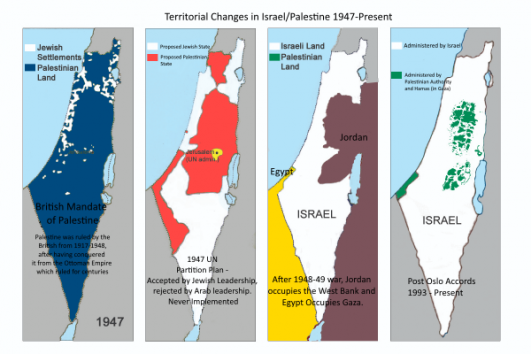After 176 days, Israel’s assault on Gaza has not stopped, and has expanded into what Human Rights Watch has declared to be a policy of starvation as a weapon of war. .... the international community has reverted to a deeply familiar call for a two-state solution, where Palestinians and Israelis can coexist in peace and security. President Biden even declared “the only real solution is a two-state solution” in his State of the Union address last month.
But the call rings hollow. The language that surrounds a two-state solution has lost all meaning. Over the years, I’ve encountered many Western diplomats who privately roll their eyes at the prospect of two states — given Israel’s staunch opposition to it, the lack of interest in the West of exerting enough pressure on Israel to change its behavior, and Palestinian political ossification — even as their politicians repeat the same phrase ad nauseam. Yet in the shadow of what the International Court of Justice has said could plausibly be genocide, everyone has returned to the chorus line, stressing that the gravity of the situation means that this time will be different.
It will not be. Repeating the two-state solution mantra has allowed policymakers to avoid confronting the reality that partition is unattainable in the case of Israel and Palestine, and illegitimate as an arrangement originally imposed on Palestinians without their consent in 1947. And fundamentally, the concept of the two-state solution has evolved to become a central pillar of sustaining Palestinian subjugation and Israeli impunity. The idea of two states as a pathway to justice has in and of itself normalized the daily violence meted out against Palestinians by Israel’s regime of apartheid.The vacuity of the two-state solution mantra is most obvious in how often policymakers speak of recognizing a Palestinian state without discussing an end to Israel’s occupation of Palestinian territory. Quite the contrary: With the United States reportedly exploring initiatives to recognize Palestinian statehood, it is simultaneously defending Israel’s prolonged occupation at the International Court of Justice, arguing that Israel faces “very real security needs” that justify its continued control over Palestinian territories.[The] failed attempts at a two-state solution are not a failure for Israel at all but a resounding success, as they have fortified Israel’s grip over this territory while peace negotiations ebbed and flowed but never concluded. In recent years, international and Israeli human rights organizations have acknowledged what many Palestinians have long argued: that Israel is a perpetrator of apartheid. B’Tselem, Israel’s leading human rights organization, concluded that Israel is a singular regime of Jewish supremacy from the river to the sea.
Now, with international attention once again focused on the region, many Palestinians understand the dangers of discussing partition, even as a pragmatic option. Many refuse to resuscitate this hollowed-out policy speak. In a message recently published anonymously, a group of Palestinians on the ground and in the diaspora state wrote, “The partition of Palestine is nothing but a legitimation of Zionism, a betrayal of our people, and the final completion of the Nakba,” or catastrophe, which refers to the expulsion and flight of about 750,000 Palestinians with Israel’s founding. “Our liberation can only be achieved through a unity of struggle, built upon a unity of people and a unity of land.” (emphasis added)
This opinion essay strongly resonated with me. It agrees with how I assessed the impact of the Nov. 4, 1995 murder of Yitzhak Rabin by an enraged, bigoted Zionist zealot with a gun. With the loss of Rabin, it dawned on me that (i) a reasonable two state solution is very likely not going to ever happen, and (ii) the Palestinian people were forever screwed. Misery, poverty, oppression and corruption (incompetence via dishonest government) would be their fate.
That is how it has turned out so far. Now, almost 40 years later, international blither about a two-state solution still makes no sense to me. Maybe I am wrong, or will turn out to be. But right now it does not feel that way.

No comments:
Post a Comment